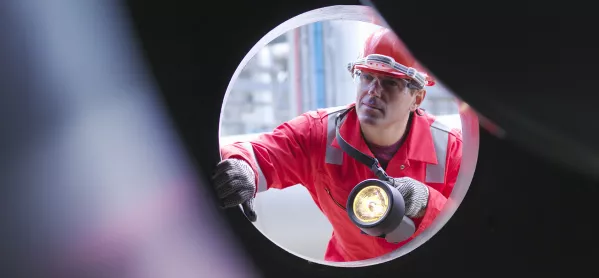- Home
- Analysis
- Specialist Sector
- Why pupil wellbeing is at the heart of new private school inspection proposals
Why pupil wellbeing is at the heart of new private school inspection proposals

Last week, we unveiled our proposed new inspection framework, which has been designed to incorporate what we have learned from a fast-moving educational context over the past six years.
This follows a nine-month review process, during which we have engaged with experts and met with government and school associations, and much of this work has also been informed by several important published reviews in recent years, which have focused on the safety and wellbeing of children.
Starting a new inspection cycle offers the opportunity to review and develop our inspection practice and our proposals are designed to be an evolution of our current inspection methodology, with several aspects of our inspection practice remaining the same.
So, what are the key changes and why are we proposing them?
It is important to note that we will continue to inspect against the Independent School Standards and other regulatory requirements.
These are set by Parliament and outline the statutory expectations for all the schools we inspect. We will continue to capture what is distinctive about individual schools, their culture and their ethos.
We will also continue to inspect schools routinely twice within a six-year inspection cycle, or as directed by the Department for Education.
Beyond this, there are several new developments that fall under two key areas.
1. Focusing on leadership and pupil wellbeing
Under our proposals, school leadership and its impact on pupils’ wellbeing will be at the heart of our inspection practice, and we will continue to seek the voices of pupils in the schools we inspect.
We are proposing to structure our reports thematically, using the definition of pupils’ wellbeing already contained in the Standards and Children Act 2004 as our guide.
The inspection report will start with leadership and management, and then include sections on pupils’ physical and mental health and emotional wellbeing; their protection from harm and neglect; pupils’ education, training and recreation; their contribution to society; and, finally, their social and economic wellbeing.
We propose that our reports will capture the complexity and richness of school life and give a clear picture of what it is like to be a pupil at that school.
Our aim is to achieve nuanced evaluations of the quality of provision across the schools we inspect.
Inspectors will always report with evidence whether the school’s provision meets or does not meet relevant standards in each section, and will include practical and helpful areas for action for every school.
We see our proposed framework as playing an important role in identifying practices worthy of sharing with other schools, which will help improve the education and wellbeing of all pupils.
Inspectors may also indicate throughout the report where aspects of the school’s provision are exceptional (with demonstrable positive impact on pupils) and call out any causes for concern.
Reports will therefore be able to signal quickly to the DfE if there are areas in a school that inspectors think need addressing as a priority.
We are also proposing to move to one type of routine inspection - currently, we have two. This will promote clarity and consistency in our reporting over time, and simplify the inspection process for schools, while reporting in detail on all aspects of school life relevant to the Standards.
2. Professional development
The second notable area we are proposing is to maximise the potential of the inspection process for wider quality assurance in schools through offering developmental inspection shadowing to aspiring and new school leaders.
Our feedback tells us that being part of an inspection team provides valuable insight and practical experience of quality assurance methods.
That is why we are proposing to introduce an associate inspector role, in addition to our existing reporting and team inspectors.
Associate inspectors will be aspiring or recently appointed senior leaders in an association independent school at the start of their senior leadership journey. Each school inspected by the Independent Schools Inspectorate (ISI) will be able to nominate one associate inspector.
These inspectors will be offered the opportunity to shadow inspections and will receive training in inspection practice.
Sector engagement
Our overarching aim is to ensure we continue to deliver high-quality external assurance, while helping schools to improve their own internal assurance systems.
We are committed to gathering feedback on our proposals from a wide range of stakeholders and will carefully consider all views that we receive.
As such, we actively encourage everyone affected by the inspection of association independent schools to complete our online survey. We are consulting for four months to allow schools and others the opportunity to respond on either side of the school holidays.
We will then use the feedback received to help improve our proposals, before testing these in volunteer schools during the autumn term.
We aim to publish the final framework next spring so that schools will have plenty of time to absorb the changes before they come into effect from September 2023.
To take part in the consultation visit: framework.isi.net
Vanessa Ward is the chief inspector of the Independent Schools Inspectorate
You need a Tes subscription to read this article
Subscribe now to read this article and get other subscriber-only content:
- Unlimited access to all Tes magazine content
- Exclusive subscriber-only stories
- Award-winning email newsletters
Already a subscriber? Log in
You need a subscription to read this article
Subscribe now to read this article and get other subscriber-only content, including:
- Unlimited access to all Tes magazine content
- Exclusive subscriber-only stories
- Award-winning email newsletters
topics in this article



